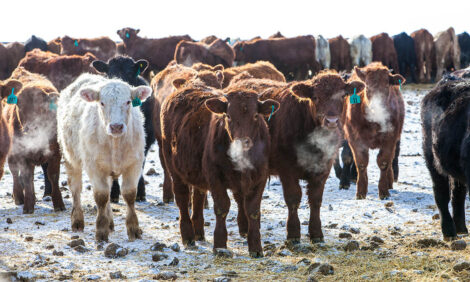



Ensuring You Benefit From Cheaper By Products
US - Mid-summer has yielded feeders and ranchers an opportunity to source cheap feed for the coming winter thanks to the recent decline in distillers dried grains prices.May and June typically see distillers dried grains (DDGs) increase in price but this year values have dropped faster than corn, potentially of great benefit to cattle profitability.
This is according to South Dakota Extension Experts Professor Darrell Mark, an agricultural economist and Cow/Calf agent Warren Rusche, who have outlined the $125/ton drop since late March.
This is a bigger drop than corn, explained Professor Darrell Mark, adding: “While lower corn prices generally translate into lower absolute prices for distillers grains, the decline in distillers grains prices is proportionally larger than the decline in corn prices.”
From trading as high as 153 per cent of corn prices, DDGs plummeted to as low as 65 per cent by early July Professor Mark added.
This marked drop can be explained by several factors, not least the pressure from the falling Soybean and Corn price.
However, a 50,000 barrels per day rise in ethanol production over the midsummer period has combined with China’s import ban on US DDGs to leave stock on the domestic market.
“China, the largest buyer of distillers grains in the world, was sharply increasing its imports of distillers grains in recent months to support its livestock industry,” he added.
“On June 9, 2014, China announced it would not issue import permits for U.S. distillers grains.”
Prior to the official ban, which was over the presence of a genetically modified trait in US DDGs, China’s largest port had ceased issuing permits in May.
A price drop of $60/ton was reported after the China ban, added Professor Mark.
Consequently, livestock farmers have the opportunity to ‘lock in’ a low feed price for winter, although should be aware of the potential storage headaches DDGs can bring, cattle expert Mr Rusche warned earlier this month.
He advised that complications are higher labour costs, the price of using covers or bags and the availability of rough feed if mixing is necessary.
“Storing WDGS can be challenging because the product by itself does not readily stack or pack in a bunker or pile,” he explained.
“One approach to solve that problem has been to mix about 70 to 80 per cent WDGS and 20 to 30 per cent roughage on an as-fed basis.”
Another solution could be the use of silage bags, while Modified Distillers Grains lend themselves better to being stored in a bunker or pile as they contain less moisture.
Michael Priestley
News Team - Editor
Mainly production and market stories on ruminants sector. Works closely with sustainability consultants at FAI Farms



